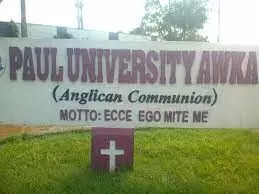Varsity’s round table ‘ll empower young scholars to strengthen democratic principles – VC

Paul University, Awka, Anambra, says its round table on national discourse will empower young scholars to strengthen democratic principles and their sustainability in Africa.
The Vice Chancellor of the university, Prof. Obiora Nwosu, said this on Friday in Awka.
Nwosu said the topics titled “The Resurgence of Military Intervention in African Politics: Causes and Challenges for African Development” and “The Dialectics of Democracy Backsliding and the Future of African Development" were apt.
He urged the discussants to deal with the topics that bordered on national and African politics professionally.
According to him, the discussants are expected to offer visible solutions to the identified challenges with the simple goal of achieving a better society and a brighter future for younger generations.
Speaking, Prof. Godwin Onu, convener of the round table, explained that the programme aimed to encourage young scholars to address African issues.
Onu, who is also the provost of the College of Postgraduate Studies at the university, said the programme expected young scholars to contribute towards strengthening democratic principles and their sustainability in Africa.
He said the university was collaborating with the Nigerian Institute of International Affairs (NIIA) in Lagos and Adekunle Ajasin University in Akingba, Akoko, and Ondo State to address pressing issues facing the African continent.
He added that a panel of experts and scholars from different institutions was gathered to provide a platform for in-depth analysis and meaningful dialogue on issues facing Africa and possibly propose solutions.
According to him, Nigerian democracy had a promising start but faced setbacks due to issues with operators who had different mindsets and ideologies towards the democracy.
The chairman of the event, Prof. Charles Obiorah, of the Department of Political Science at Anambra State University, Igbariam, commended the organisers of the round table for their brilliant packaging.
Dr. Kester Onor, a resource person from NIIA, said that imperialism, sit-tight syndrome, power elongation, insecurity, corruption, a high level of resentment, and insurgency, among others, were reasons for military coups in Africa.
The legal adviser of the university, Prof. Carol Arinze-Umeobi, said that issues such as human rights abuses and disruptions of democratic processes could aid military interventions.
Meanwhile, some speakers agreed that strengthening democratic institutions and protecting fundamental rights and freedoms were steps towards safeguarding and advancing democracy in Africa.




